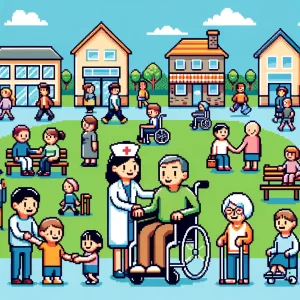
Not There Yet: Understanding Racial and Ethnic Disparities in U.S. Health Care
For nearly two decades, the Commonwealth Fund has dedicated itself to assessing the health and health care of various states across the U.S. Their latest report offers a sobering view of the disparities in health outcomes and access to care among different racial and ethnic groups. With comprehensive data on 25 health system performance indicators, the report serves as both a diagnostic tool and a call to action for policymakers and health system leaders.
The Stark Reality of Health Disparities
Despite advancements in medical technology and health care systems, significant disparities persist in the health and well-being of Americans, particularly among Black, Hispanic, and American Indian and Alaska Native (AIAN) populations. These groups experience lower life expectancies and higher rates of chronic conditions, such as diabetes and hypertension. The COVID-19 pandemic exacerbated these disparities, leading to a sharper decline in life expectancy for these populations compared to their white counterparts.
Factors Driving Health Inequities
The roots of these disparities are deep and multifaceted. Factors such as socioeconomic status, access to green spaces, and levels of pollution significantly impact health outcomes. However, a critical barrier remains the lack of affordable, quality health care, which is less accessible to people of color. Issues like high rates of uninsured individuals and systemic racism within health care settings compound this.
Evaluating State Performance
The report reveals that health outcomes, as well as access to and quality of health care, vary not only between states but also within states among different racial and ethnic groups. States like Massachusetts, Rhode Island, and Connecticut show higher health system performance scores across all groups, yet disparities remain. In contrast, states like Oklahoma and Mississippi exhibit low-performance scores for all analyzed groups, highlighting significant inequities.
For more, you can always check out County Health Rankings and Roadmaps.
How Can We Improve?
Policy Changes to Bridge the Gap
The path to equity in health care involves comprehensive policy changes at both the state and federal levels. Expanding Medicaid in the 10 states that have not yet done so could dramatically improve access to health care for many underserved populations. Additionally, enhancing the availability and affordability of health insurance and reducing administrative burdens that disproportionately affect people of color could lead to significant improvements in health equity.
Strengthening Primary Care
Primary care is pivotal in managing chronic diseases and providing preventive care. Policies that support primary care providers, especially in underserved areas, and that incentivize the care of marginalized communities can play a crucial role in closing the health disparity gap.
Conclusion: A Continued Fight for Equity
The Commonwealth Fund’s report underscores a clear and urgent need for targeted strategies to address the deep-seated inequities in the U.S. health care system. By harnessing the power of detailed data and informed policymaking, we can begin to dismantle the barriers to health equity.
As we move forward, it’s imperative that we keep these conversations alive and pressing, ensuring that every individual, regardless of race or ethnicity, has access to the health care they deserve. It’s not just a matter of policy but of fundamental human rights.
Engage with Us
We encourage our readers to engage in this conversation. What changes would you like to see in your community to promote health equity? Share your thoughts and experiences in the comments below.
Lead the Way in Public Health – Get Your Weekly Insight!
Ready to lead the charge in health advocacy and research? ‘This Week in Public Health’ delivers essential weekly updates, keeping you informed and ahead in the dynamic field of public health. With insights on the latest breakthroughs and initiatives, our newsletter is your gateway to being a proactive leader. Subscribe for free and start shaping the future of public health today!
About the Author
Jon Scaccia, with a Ph.D. in clinical-community psychology and a research fellowship at the US Department of Health and Human Services with expertise in public health systems and quality programs. He specializes in implementing innovative, data-informed strategies to enhance community health and development. Jon helped develop the R=MC² readiness model, which aids organizations in effectively navigating change. He cares about disparities and inequities, and know he has a long way to go



